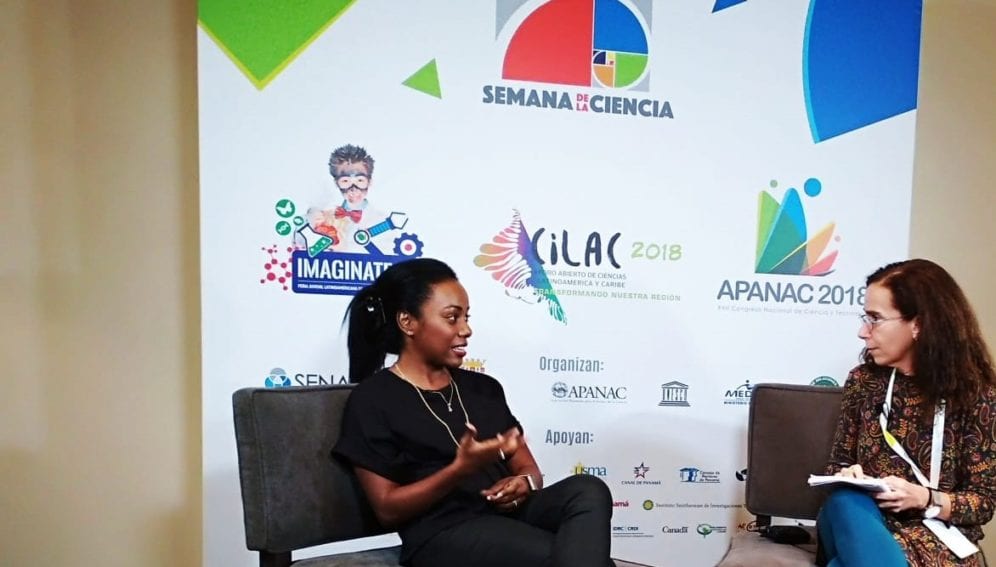Send to a friend
The details you provide on this page will not be used to send unsolicited email, and will not be sold to a 3rd party. See privacy policy.
[PANAMA CITY] Simone Anne Marie Badal-McCreath, a Jamaican chemist and cancer researcher, had always planned to be a medical doctor. But, during her bachelor in biochemistry, she fell in love with research.
Dissatisfied with the source material that she was given at university, Badal decided to write her own plant chemistry textbook. Now, age 37, she lectures in medical sciences at the University of the West Indies in Mona, Jamaica.
Two years after Badal finished her PhD in Biochemistry, she was one of five women to win the 2014 OWSD-Elsevier Foundation Award, given jointly by Elsevier and the Organization for Women in Science for the Developing World.
Could you tell us about your research career?
I graduated in 2012, and my PhD focus focused on screening Jamaican natural products for potential anticancer properties, that is, if they would be able to slow, block or reverse the progress of cancer. We studied three different cancer cell lines: breast, colon and liver cancer. At the end of that research, it was clear that several of our Jamaican natural products blocked cancer-causing cell pathways. We also found that a few of our compounds killed colon cancer cells but did not harm normal colon cells. The next step would be in vivo work.
Tell us about winning the OWSD-Elsevier Foundation Award for Early Career Scientists in the Developing World
The award was specifically focused on chemical sciences. The dean of the faculty nominated me and I represented the Latin America and Caribbean region.
Each winner received US$5,000 and an all-expenses paid attendance at the American Association for the Advancement of Science Annual Meeting in Chicago, United States, where the award was presented. It was quite memorable. Because of that award, several doors opened for me in terms of accessing grants, funding and building my career as a young female scientist in the Caribbean.
It was after the award that you got your job at the University of the West Indies.
I was employed as a lecturer, which is equivalent to an assistant professor position in the United States. I was able to secure grant funding to the amount of US$90,000, and so I set up a cell culture lab. My vision is to build the first world cancer centre that serves the Caribbean; a centre that can develop personalised medicine to treat cancers that affect Caribbean men and women. I am not certain if I will see it, but somehow I hope to contribute to that through my work and my students.
You wrote your own textbook. What’s the story behind that?
While I was doing my Ph.D., I was also teaching pharmacognosy (the study of medicinal drugs derived from plants or other natural sources). I went home and I was telling my husband: “I am not so happy with the textbook,” and he said: “why don’t you write your own?” I laughed at first because I was not even finished yet with my Ph.D. But, then I developed an outline. Soon, I recognised that one of the people involved with my award was Elsevier. I used that as an opening to contact them. After several discussions, they further refined my outline and sent it o several international experts in the field. A couple of years later, here we are – it’s published! The final book is a compilation of contributions from 70 experts in the world.
Do you think that it is more difficult to be a female scientist than a male scientist in your country?
At this point, I can’t say either way. Personally, I have achieved – relatively speaking – a lot in a short space of time. I had support from both male and female scientists. I recognise that my age was perhaps a stumbling block; some people might think you are too young to progress so quickly. But I always pulled out resources, not just from my family members, but also from academia. Yes, I know that there are other people who would say that to be a female scientist is more challenging, but I have not reached that stage. I’ve got challenges all over, so I just focus on what needs to be done.
Why did you decide to become a scientist?
When I was in high school I actually wanted to be a medical doctor, but when I was doing my bachelor’s, a particular professor contributed to me falling in love with research. I decided to do a master’s, and that was also challenging. But I pulled through. I was able to get it done in two years, and for us that is very fast. I also got several peer-reviewed publications for that work. Even though I experienced numerous challenges in doing that, I recognised that I love it. I am passionate about research, and because I am passionate about it, it doesn’t matter what comes my way.
Last year in January you created a foundation. Tell us about that
It is called the ACRJ Foundation, and it aims to help people who have dropped out of high school – because of pregnancy, fighting, or whatever the reason is. We are helping them to get the Caribbean Secondary Examination Certificate so that they can become employable and are not just left alone by the wayside. It’s not just teenagers, it’s for adult men and women, as long as they fit our eligibility profile. We are also offering mentorship to these students. I think it’s important, as we strive to achieve the best in our career, to give back.














